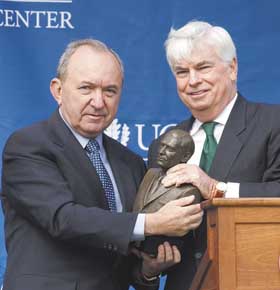  |
| HOME | THIS ISSUE | CALENDAR | GRANTS | BACK ISSUES | < BACK | NEXT > |
Dodd prize in
human rights
shared by two international jurists
|
||||
|
Some 300 people gathered on the plaza of the Thomas J. Dodd Research Center Monday to honor two attorneys for their roles in advancing international justice. Louise Arbour, high commissioner for human rights for the United Nations, and Richard J. Goldstone, retired justice of the Constitutional Court of South Africa, were awarded the second biannual Thomas J. Dodd Prize in International Justice and Human Rights. Both have served as prosecutors at the International Criminal Tribunal for the former Yugoslavia, which Goldstone helped establish. The Dodd Prize is named for the late Thomas J. Dodd, who was a Connecticut senator from 1959 to 1971 and was executive trial counsel during the post-World War II Nuremberg trials. The $75,000 prize will be split between the two winners. “Our honorees come to us from two nations, one nearby, the other distant in terms of geography, but not, we believe, in terms of commitment to social justice and human freedom,” said University President Philip E. Austin. Describing Arbour and Goldstone as heroes, Austin added, “We are also pleased to honor the countless others whose names we may not know who struggle year in and year out in climates far less hospitable than our own to make all of the many, sometimes contradictory elements of human rights and social justice living, working realities.” Former U.S. Rep. Barbara Kennelly, a member of the Dodd Center’s National Advisory Board, said, “I can’t help but think if Thomas J. Dodd were here this morning, how he would delight in talking to the high commissioner about her work and how she faced down those who committed terrible violations of international law. How delighted he would be to talk to Justice Goldstone about his work at Nuremberg, and about the transition of South Africa to the democracy that it is today.” Kennelly currently is president of the National Committee to Preserve Social Security and Medicare. Sen. Christopher Dodd (D-Conn.), who presented the prize to Arbour and Goldstone, said his father’s “tireless devotion to his family, to justice, and to humanity were the inspiration for the Dodd Center and the Dodd Prize.” As a child, Dodd said, it was “difficult for me to understand the importance of the task at Nuremberg. How could anyone understand at such a young age the atrocities committed by the Nazis, the genocide, the hate, the brutality? Looking back, I must confess that I have no better understanding now than I did as a child, why anyone would perpetrate such heinous acts. What I did understand, and what we must all understand, is that we have a collective duty to protect humanity from such crimes.” He said his father’s hope “was that Nuremberg would inspire world leaders to move beyond the concept of an ad hoc court for war crimes and to work toward the creation of a permanent court, one that would not only prosecute those guilty of crimes against humanity but would also act as a deterrent, because of its permanency, against future crimes.”
Dodd thanked Arbour and Goldstone for their “unflinching dedication” to advancing human rights causes and for “helping move my father’s dreams closer to reality.” Arbour, who is best known for serving an indictment on Yugoslav President Slobodan Milosevic in 1999, said Thomas Dodd realized that “the way to respond to even the cruelest and most callous disregard for humanity was through laws and through justice.” She said that she shares, along with Dodd and Goldstone, “the profound conviction that was so famously put by Justice Robert Jackson, chief prosecutor for the U.S. at the opening of the Nuremberg trials, ‘to submit captive enemies to the judgment of the law is one of the most significant tributes that power has ever paid to reason.’ This statement not only lays the foundation for the morally superior choice of justice over brutal revenge, but it also asserts the undeniable superiority of the rule of law over the rule of force.” She said the rise of international criminal justice has met with tremendous resistance, ranging from cynical dismissal to outright hostility. “Like many, I deplore the United States’ rejection of the International Criminal Court,” she said. “The ICC reflects the emerging power of an international human rights culture. The old strategy of peace without accountability, to which there have been some historical exceptions, is no longer effective.” Goldstone said the U.S. “led the way in establishing the first ever truly international criminal tribunals for the former Yugoslavia and Rwanda. Without U.S. support, the tribunals never would have functioned.” The U.S., he said, “has traditionally harbored fears for and suspicions of international organizations, particularly those that might exercise oversight over the actions of the United States,” adding, “The U.S. opposition to the ICC is tragic and notorious.” |
| ADVANCE HOME UCONN HOME |

